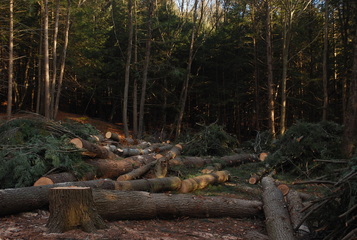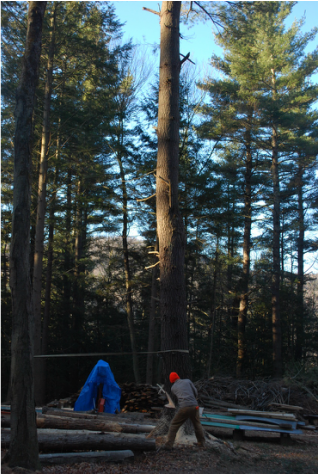 The mayhem that is the clearing of land. It's been two months since my last post, and in that time we've raised our house with an amazing outpouring of community effort, spent two weeks getting the first iteration of our roof set for the winter, and we now are spending all suitable weather clearing more around the house. This is a return to the first work we did here at the land, and it feels very familiar. This time, as opposed to before, we're going to have our heavy-machine operator of choice, Jim Herrick, use his excavator to compile our logs at the mill, and move some of the branches and stumps to the edge of the clearing. We'll most likely burn some brush (which we haven't done in the past) as well. The hand-rolling of logs with peaveys has been the most physically and emotionally taxing work of all, so we're going to save ourselves some stress there. And we've already ordered many apple trees from FedCo which will quickly be residing in newly opened niches of the topography. I've been thinking recently of how destructive we humans are just as a matter of existence. I don't intend that statement to carry negative connotation, to me it's a fact. I often like to think of how similar we are to beavers in the way we change our immediate environment to suit our preferential version of living, rather than adapting ourselves to wherever we happen to be. They help me to perceive it as one of the natural approaches to living on this planet. There is nothing necessarily good or bad about that preference it seems to me, rather, positive and negative results seem to be more related to the scope of that alteration, and how it fits in with it's particular habitat. Not unlike the beavers, Meggie and I are cutting down trees in order that we may use them to our benefit, and also utilize the space they once inhabited to provide room for our home and a micro-environment that suits our sustenance of choice. If you look at the picture accompanying the beginning of this entry, you see the current (as of a couple days ago) state of one part of our clearing efforts near the house. Even though I'm consciously deciding to proceed with the homestead in this way, the process looks incredibly destructive, because it is. We need to destroy, or end, the lives of many other things in order that our lives continue. It's hard to get around this basic principle in nature. If we accept this precept, and consider the scale of destruction and alteration required to support one human being in this current cultural context, I think it follows that we're way up at the top of the list of "Creatures Requiring the Most Resources." This is why I have the hardest time understanding the apparently assumed truism that more people is always a good circumstance, that reproducing is always a good choice, that economic and population growth are inherently good goals. Why can't we collectively see the faults in this logic? Population dynamics in all species of plants and animals work in cycles and balance. All species are limited by the same existent amounts of any given energy or resource. Historically, these dances of predator and prey circling around each other in abundance and lack have occurred in particular parts of the environment. Islands have often proven to be especially instructive since their borders of resources are so obvious and static. Now, I think it's time we consider the island that is the Earth. Our population trajectory is only a "success" story if you don't read the last chapter of the book, because we too, eventually reach that limit of resources. We can disagree about when that may happen, but no one can presume it won't without engaging in willful ignorance.  Here I end the life of an 80+ year old pine to help support my own. The human species certainly is clever if not wise. Over and over again we have figured out ways to inhabit every part of this planet whether hospitable or not, moving and removing resources from one place in support of another, hiding waste and decay out of sight and out of mind. It's so complex now that most people have very little or no idea of what it takes to support their life, and from how many different continents the needed resources are taken. Probably no one can understand it as a whole. But satellites and space junk notwithstanding, this entire play happens within the bounds of our planetary island. And our species' lives are not more precious or important than any others in this world. We are all subjected to the same limitations--hawks, chickadees, butterflies, efts, spider mites. How pressing these considerations are to you depend on how you think of the value of human life. Are two deaths twice as bad as one? Four deaths twice as bad as two? When the beavers exploit one region of habitat and their population surges just as the resources run out, they experience a population crash. This has happened to human cultures before too. But if we continue to tell ourselves that more of us is always better, we will ride that misconception onward past 10 billion people, and when that population crashes, well...you do the math.
9 Comments
Martha Wilkins
12/21/2012 01:24:32 am
I think our species' lives are more important and precious. But, I'll grant you, only to us. To the rest of nature, more costly.
Reply
Donna Wilkins
12/21/2012 04:03:08 am
I agree about the cost of our destruction, and didn't take lightly my decision to bring more lives into the world. I will claim biology won out, and I have never been more convinced that bringing you and your brother into this world has been more beneficial to the human species (and to myself) than I could have ever imagined.
Reply
Lucy Chapman
12/23/2012 01:14:47 am
Right on, Donna. You and I are fortunate moms to have received true blessings into this world in the form of our children. Still, I agree with Patrick that giving birth is not a necessary choice in life, and that population growth in this world has consequences. I appreciate our children being so conscious about their decisions.
Reply
Robert F Leary
12/21/2012 09:02:45 am
I'd just like to add that the way human societies live have a huge impact. How people live, the means of subsistence, has more to do with the amount of resources used then population nubmers
Reply
12/21/2012 12:20:20 pm
Thanks for the comment! You're the first person to comment on my blog whose name I don't recognize! I agree that the methods of subsistence have much to do with our impact on the world--I'm attempting to live that belief in as many of my choices as possible. But I think after a certain point in the growth of our population, the sheer magnitude of human presence means that even if all of us on this planet were to miraculously change face and feel okay with having less, there just aren't enough resources to go around. It's very in vogue right now to talk about our lifestyle choices, (energy efficient appliances, slightly improved gas mileage) up to a point--but the discussion always falters where our conveniences decline, and the difficult, and therefore powerful, choices lie. That's why I posted about our collectively exploding population, because it seems to me that for some reason or combination of reasons, this topic remains taboo, though I believe it's of vital importance to the future of all living things on this planet.
Reply
12/21/2012 02:36:39 pm
I recently heard of the lost colony of Roanoke, an island off Virginia, settled in 1597. Three years later there was no sign of any human habitation and the people vanished. I thought, "That's what it means to not leave a footprint." I thought, "Wild animals leave very little trace when they are gone." The part that interested me was the concept of history. If there is no story, then others do not learn. I thought, "if every human left no trace, there would be no history, then we wouldn't have to go to school!" I thought it would be nice if people lived so closely to their environment that there would be no trace of them after they died. But we humans are creative and always solving challenges. It's just what we do. When the discoveries and improvements come faster and faster, then the long term effects cannot be understood until some bad side effects develop along with the original good effect. So I guess we do need school to help sort out this thing called living equitably.
Reply
12/21/2012 03:22:13 pm
PS!
Reply
12/21/2012 03:22:21 pm
PS!
Reply
Leave a Reply. |
Meggie
Recording moments from our journey on the Pacific Crest Trail. (All pre-2015 entries are Patrick's words on work and life at the homestead). Archives
March 2016
Categories |
 RSS Feed
RSS Feed
